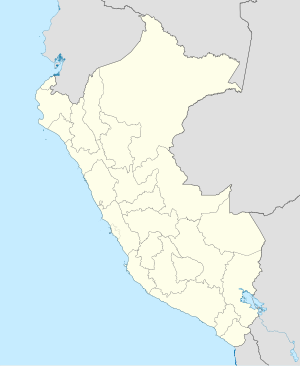Minas Ragra: Difference between revisions
m sp |
mNo edit summary |
||
| Line 24: | Line 24: | ||
| closing year =1955 |
| closing year =1955 |
||
}} |
}} |
||
The '''Minas Ragra''' was a large [[vanadium]] [[mining|mine]] in the [[Pasco Region]] of [[Peru]]. The deposit was discovered by a [[United States Geological Survey]] expedition on November 20. 1905.<ref>{{cite journal | journal =Engineering and Mining Journal | title = A new occurrence of vanadium in Peru| year =1906 | volume = 82 | issue =9 || page = 385 | url = https://babel.hathitrust.org/cgi/pt?id=mdp.39015011434712;view=1up;seq=421| first = Donnel Foster | last = Hewett}}</ref> Members of this expeditions were [[Donnel Foster Hewett]] and [[José J. Bravo]] In this deposit the mineral [[patrónite]] was first discovered by a member of the expedition Antenor Rizo-Patron.<ref>{{cite journal|last1=Hillebrand|first1=W. F.|title=THE VANADIUM SULPHIDE, PATRONITE, AND ITS MINERAL ASSOCIATES FROM MINASRAGRA, PERU.|journal=Journal of the American Chemical Society|volume=29|issue=7|year=1907|pages=1019–1029|issn=0002-7863|doi=10.1021/ja01961a006}}</ref> A mine was established in very short time by the [[Vanadium Corporation of America]]. By 1914 75% of the world vanadium ore production was coming from the [[Minas Ragra]] in Peru |
The '''Minas Ragra''' was a large [[vanadium]] [[mining|mine]] in the [[Pasco Region]] of [[Peru]]. The deposit was discovered by a [[United States Geological Survey]] expedition on November 20. 1905.<ref>{{cite journal | journal =Engineering and Mining Journal | title = A new occurrence of vanadium in Peru| year =1906 | volume = 82 | issue =9 || page = 385 | url = https://babel.hathitrust.org/cgi/pt?id=mdp.39015011434712;view=1up;seq=421| first = Donnel Foster | last = Hewett}}</ref> Members of this expeditions were [[Donnel Foster Hewett]] and [[José J. Bravo]] In this deposit the mineral [[patrónite]] was first discovered by a member of the expedition Antenor Rizo-Patron.<ref>{{cite journal|last1=Hillebrand|first1=W. F.|title=THE VANADIUM SULPHIDE, PATRONITE, AND ITS MINERAL ASSOCIATES FROM MINASRAGRA, PERU.|journal=Journal of the American Chemical Society|volume=29|issue=7|year=1907|pages=1019–1029|issn=0002-7863|doi=10.1021/ja01961a006}}</ref> A mine was established in very short time by the [[Vanadium Corporation of America]]. By 1914 75% of the world vanadium ore production was coming from the [[Minas Ragra]] in Peru, making the mine to the world leading producer of vanadium.<ref>{{cite journal | last =Fischer| first = Siegfried| title =Uranium and Vanadium | year= 1914 | journal = Early Publications of the Lehigh Faculty | issue = Paper 293. | url = http://preserve.lehigh.edu/early-faculty-publications/293}}</ref> With the production of vanadium as side product of uranium mining from carnotite the mine had to close in 1955. |
||
== See also == |
== See also == |
||
Revision as of 16:40, 7 October 2019
| Location | |
|---|---|
| Pasco Region | |
| Country | Peru |
| Production | |
| Products | Vanadium |
| History | |
| Opened | 1906 |
| Closed | 1955 |
The Minas Ragra was a large vanadium mine in the Pasco Region of Peru. The deposit was discovered by a United States Geological Survey expedition on November 20. 1905.[1] Members of this expeditions were Donnel Foster Hewett and José J. Bravo In this deposit the mineral patrónite was first discovered by a member of the expedition Antenor Rizo-Patron.[2] A mine was established in very short time by the Vanadium Corporation of America. By 1914 75% of the world vanadium ore production was coming from the Minas Ragra in Peru, making the mine to the world leading producer of vanadium.[3] With the production of vanadium as side product of uranium mining from carnotite the mine had to close in 1955.
See also
- Lluis Fontbote; G. Christian Amstutz; Miguel Cardozo; Esteban Cedillo; Jose Frutos (27 November 2013). Stratabound Ore Deposits in the Andes. Springer Science & Business Media. p. 595. ISBN 978-3-642-88282-1.
- Trefzger, Erwin F. (1951). "Vanadium lagerstätte Mina Ragra in Peru". Berichte der Naturforschenden Gesellschaft zu Freiburg i. Br (in German). DWI.
- Phillip Maxwell Busch (1961). Vanadium: A Materials Survey. U.S. Department of the Interior, Bureau of Mines.
- "The Story of Mina Ragra". Engineering and Mining Journal. McGraw Hill Publishing Company: 59. January 1947.
References
- ^ Hewett, Donnel Foster (1906). "A new occurrence of vanadium in Peru". Engineering and Mining Journal. 82 (9): 385.
{{cite journal}}: Cite has empty unknown parameter:|1=(help) - ^ Hillebrand, W. F. (1907). "THE VANADIUM SULPHIDE, PATRONITE, AND ITS MINERAL ASSOCIATES FROM MINASRAGRA, PERU". Journal of the American Chemical Society. 29 (7): 1019–1029. doi:10.1021/ja01961a006. ISSN 0002-7863.
- ^ Fischer, Siegfried (1914). "Uranium and Vanadium". Early Publications of the Lehigh Faculty (Paper 293.).
10°51′34″S 76°34′19″W / 10.8595632°S 76.5720061°W

